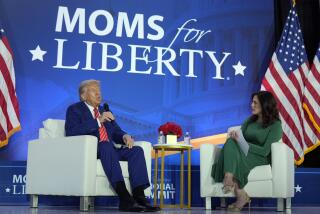NEWS ANALYSIS : Liberalism on Defensive in Once-Receptive Israel : Ideology: Survival of the liberal tradition among a people long identified with it is questioned.
Several hundred liberals from Israel and the United States gathered at a small college campus here to fashion strategies to gain ground for their ideas among an unreceptive, sometimes scornful Israeli public.
But before getting down to new tactics, speaker after speaker engaged in what seems to be a popular pursuit of liberals everywhere. They laid out a list of criticisms harsh enough to dampen any revival: Liberals in Israel were far too closely identified with the Palestinian cause, some said. They are too elitist, others contended. They are too dismissive of Jewish religious tradition. Unrealistic. Chauvinistic. Supercilious.
The downbeat opening of the recent sessions highlighted the dilemma of a culture that once defined the Jewish world view but is under fire in Israel.
Liberalism--either as an ideology for collective action or for protection of the individual in the face of the demands of state and government--is clearly on the defensive.
But its retreat in Israel is, perhaps, especially surprising, given the intense identification of Jews with liberalism. In the United States, for example, the term “Jewish liberal” is a singular badge of identity. And despite the ill fortunes of liberals in national politics, American Jews continue to vote for the Democratic Party in big numbers.
Historically, the Jewish link with liberal politics dates at least as far back as the 17th Century, when Jews in Europe sided with the emerging commercial class to press for individual rights and an end to the rule of kings by divine fiat. Jewish philosophers were among the main theorists of the rational thought that is the basis for liberal politics.
But can Jewish liberalism survive in the Jewish state, where Jews are for the first time in hundreds of years in power instead of in a vulnerable minority?
When Israeli liberals aren’t upbraiding themselves, they are subject to fierce attack by rivals. They bear the labels of “leftists” for their connections with defunct socialist projects, “Arab lover” for their passion for peace with the Palestinians, “elitist” and even “racist” for their European roots and attitudes toward Israel’s large North African and Near Eastern population. Liberal ideas are dismissed as a remnant of the galut, or diaspora, and inapplicable to life in Israel, where Jews are in power.
In politics, liberals have suffered an electoral decline dating back 14 years, when right-wing parties first won power in Israel.
The flagship Labor Party, once Israel’s unchallenged powerhouse, has done no better than run even with its main rivals, the right-wing Likud. At best, Labor has been forced to govern in tandem with its ideological enemy and on occasion to beg religious parties, with their unliberal view linking synagogue and state, to join with them in coalitions.
Labor and leftist parties are now out of power, and, by most predictions, will slip further into the cold in elections scheduled for no later than November, 1992.
Meantime, socialist values that were part of the liberal vision of Israel’s founders are quickly disappearing. Kibbutz collective farms and central social planning are in disrepute.
As elsewhere in the world, the free market is replacing the utopia of planned economies. (Almost everyone in Israel appears to be an economic, free-market liberal as opposed to a social liberal; one of the ruling Likud Party factions calls itself the Liberal Party.)
More broadly worrisome, liberal thinkers say, is the staying power and growth of anti-democratic attitudes. Surveys show a slippage in the belief in democracy among the young. Newspaper censorship is accepted docilely by editors and reporters. An us-against-them tribal atmosphere infects political discourse; leftists are dubbed traitors to the nation for their pro-peace stands.
The conflict with the Palestinians, viewed as a main cause of the decline of liberal values in Israel, is also the arena where the dangers of decay are plainly in view, liberals contend. Word of the torture of Arab prisoners, sanctioned in Israeli courts with the official euphemism “moderate physical pressure,” is received with a shrug.
Housing demolitions, land seizures and the long closure of Palestinian schools are tolerated. Confiscation of Arab personal goods for tax purposes was condemned only by peace groups. The claim to the West Bank and Gaza as part of a biblical promise, itself a kind of rule by divine right, has become a basis for political action.
“Things are happening that, 20 years ago, many thought were impossible. The norms of behavior are progressively changing for the worse,” said Zeev Sternhell, a self-described liberal who is a political theorist at Hebrew University and an expert on fascism.
Sternhell argues that the duration of Arab-Israeli hostility makes it hard to keep up liberal values, which he defines as supremacy of the rights and needs of individuals over the state. Rather, he believes, the conflict fuels a trend toward identification by tribe, with individual rights in second place.
“Individuals will be ground down by the nation and state,” he declared. “As long as the struggle with the Arabs goes on, anti-liberal trends will grow stronger and stronger.”
While Sternhell takes pride in Israel’s ability to maintain democracy in a hostile environment, he laments that the rights of Israelis are not enshrined in a constitution. “Liberal democracy is a kind of luxury,” Sternhell went on. “It is a heritage of the past that is easily destroyed.”
Yaron Ezrahi, a Hebrew University political scientist and peace activist, sees the liberal dilemma in Israel as part of a global trend. Liberalism is being nudged aside by intense nationalism, religious fervor or both. The symptoms, liberal analysts contend, are visible in different strengths in a variety of places: in the jingoist war euphoria in the United States, the explosive Hindu nationalism in India, in the national conflicts in Eastern Europe and renewed chauvinism in Western Europe (with its anti-Semitic flavor).
Israelis are offered a choice of three roads to a self-identity, Ezrahi believes--the purely nationalist, the religious and what he calls the “universal liberal tradition of civic culture.” The nationalists and the religious have teamed up to assault the third by pinning the tag of Arab lover and wimp on liberals while proclaiming themselves to be all-powerful soldiers in a mythic struggle for the Holy Land, Ezrahi asserts.
“Their story is one of redemption, of a cosmic battle between Good--us--and Evil--the Arabs. Our God against theirs,” Ezrahi said. “The liberal answer, on the other hand, pales by comparison. We say, ‘We must defend ourselves against our enemies, yes, but still be virtuous.’ Which story sounds more exciting to you?”
Liberal politicians in Israel have been trying to shed their limp image with a new, muscular stand on the issue of peace with the Palestinians. They no longer state their case in terms of liberal values. Gone are references to the defense of the powerless under occupation or the damage done to Israeli democracy in the course of repressing the Arabs. Instead, the focus now is on the impossibility of getting along with the Arabs. Palestinians and Israelis must be separated--not for some abstract good but for safety.
The new thrust emerged after a Palestinian knifed three Israelis in Jerusalem last fall, and enraged citizens not only attacked Arabs in the street but assaulted the homes of local leftists.
“The possibility for coexistence is dead,” said Avraham Burg, a dovish member of the Labor Party. “In the meantime, peace will come out of hatred. It will be based on self-interest, not good will.”
Liberals bank on attracting voters, who until now line up with right-wing or religious parties, on the Arab issue. “Here, the only thing separating left and right in the people’s mind is their stand on compromise with the Arabs,” said Amnon Rubenstein, a member of the Shinui Party. The party, whose name means center, takes a liberal but non-socialist line on Israeli issues. It holds only two of 120 seats in Israel’s Parliament.
Israeli liberals suffer from the weight of their own myths, Rubenstein contended, which at the state’s founding included the promise of a new society that would be “a light among nations. That was always pretense and hyperbole. I’m satisfied with much less: a democratic state with a civil society.”
A battle between the perceived, weak-kneed liberalism of the past and the presumed pumped-up liberalism of the future is expected to take shape soon in the Labor Party.
Party leader Shimon Peres, associated with the dovish wing of Labor, will be challenged by Yitzhak Rabin, who has chiseled out a tougher image.
Many observers consider Rabin’s chances in taking on rightist Prime Minister Yitzhak Shamir to be better than those of Peres. Nonetheless, Labor, the No. 2 vote getter after Shamir’s Likud, faces a dilemma similar to that of the Democratic Party in America: Why should voters choose a born-again hard-line party rather than one that has always flexed its muscle?
“The Israelis are likely to vote for the real thing rather than a Labor imitation,” predicted Hebrew University’s Ezrahi.
Ezrahi was among dozens of speakers at the late June Jerusalem conference of liberals, organized by the Oakland-based Jewish-American magazine Tikkun. The gathering was imbued with a yearning for faded liberal values; informal get-togethers of the urbane crowd were called kumzits, a term for a kind of around-the-campfire songfest popular in Israeli pioneer days.
As if the self-criticism of the liberals present wasn’t enough, outside commentators also unloaded on them. A column in The Jerusalem Report magazine put down the meeting as a kind of Woodstock for out-of-date elitists.
The writer, former Likud government spokesman Zeev Chafets, offered tongue-in-cheek advice, including the plea for the liberals to “say something good about this country. I know it’s an ugly little colonialist occupier full of Levantine Likudniks, but some people here feel attached to it. If you can’t think of anything else, try praising the fruit.”
Liberals also fell under a barrage of criticism from religious political leaders who charged them with sloughing off Jewish tradition. When the Labor Party was vying with Likud for power last year, one leading rabbi criticized them for eating rabbit and pigs, both non-kosher dishes. A recent attack on kibbutzim as irreligious was viewed as a wider assault on secular society, which liberal and leftist parties aspire to represent.
Even a liberal newspaper took the conference to task for supposedly taking a Jewish-American line on how to solve Israeli problems. The rap reflects the feeling among many Israelis that Americans are overeager to impose their views on beleaguered Israel.
After the gathering ended, an incident involving the conference organizer, Michael Lerner, the editor of Tikkun and a fixture from the anti-war 1960s, shed light on the pitfalls of importing diaspora views.
The father of an Israeli teen-ager who was kidnaped and killed by Arabs last year asserted that Lerner, during the conference, encouraged Israelis to avoid army service in the West Bank and Gaza Strip. A workshop at the conference offered “strategy for those facing the army or reserve duty,” according to the conference schedule. In any event, police were investigating Lerner on charges of incitement to defy Israeli law, newspapers said.
The American seemed in little danger of immediate prosecution; incitement is not an extraditable offense and Lerner had already left the country.
More to Read
Sign up for Essential California
The most important California stories and recommendations in your inbox every morning.
You may occasionally receive promotional content from the Los Angeles Times.






